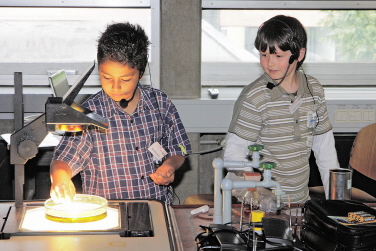Small versions of Gyro Gearloose give a thrilling presentation of "Technology for dummies"
(sf) Do crystals always look the same? Do acids and bases have colour? And why does red cabbage only really become red during cooking? The answers to these and many other questions were explained on 19th June 2009, although not by parents to their children, but by primary school children to other children and attentive adults. 20 pupils presented exhilarating phenomena from the world of nature and technology at D UAS.
Third and fourth-year classes with exceptional natural science skills have been nurtured over the past year by the Competence Center for Fostering Skills (CCB) at the initiative of and in collaboration with Prof. Dr. Karl Schwister from the Faculty Heavy Engineering and Process Technology. They recently presented the results of their efforts at the "1st Düsseldorf Junior Congress of Natural Science and Technology". And quite impressive they were, too: The smaller versions of Gyro Gearloose moderated, experimented and researched in presentations and workshops, such as "Chemistry for dummies", "Electron harvest – Watt is going on?" or in the "The Chaotic Laboratory".
Burkhard Hintzsche, school and youth representative for the City of Düsseldorf, was satisfied with the results: "It's about uncovering and nurturing the children's talents. If they are not challenged, children feel they are not being stretched and consequently lose interest in technology and natural science."
A further positive aspect for the youngsters was that they were able to pass on what they had learned to others, and this in the form of appealing and rousing presentations. "What I liked best was that we could arrange the complete presentations ourselves. Being able to present the outcome of the trials today is the absolute highlight", said Jonas Meier (9). Although a little stage fright was to be expected, the little scientists mastered everything like professionals at the end of the day: "At the beginning I was very nervous at the thought of presenting our work in public here. But then everything went well and was great fun. It was cool", recalled 10-year old Lena Holz.
Dr. Brigitte Arens, head of the CCB was also impressed: "At the end, the children were unanimous in saying that not only was the congress a success, all of them thought that the challenges beforehand were likewise superb. All the participants want to continue and hope that other children can benefit from the same opportunities." According to Mr Hintzsche, it is planned to extend the project to take in secondary schools, perhaps the fifth or sixth school years.
A mobile laboratory will soon take to the road. "We're preparing a bus for young researchers. This will be well enough equipped to enable experiments to be made in the schools", declared Prof. Dr. Schwister. Alongside many other activities, the professor for chemistry and bio-process technology also prepared the congress with crash courses. He has already developed a successful concept to nurture pupils in school years three to six in St. Augustin.
